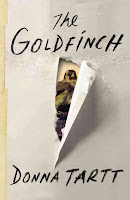It happened in New York, April 10th, fourteen years ago. (Even my hand balks at the date; I had to push to write it down, just to keep the pen moving on the paper. It used to be a perfectly ordinary day but now it sticks up on the calendar like a rusty nail.)The explosion and Theo's escape is brilliantly written. Tartt captures Theo's confusion, disorientation and desperation with great realism. Theo's interaction with Welty, and witness of his death had me entranced. Tartt managed to evoke deep empathy and connection with this man, essentially a stranger, by sharing the intensely personal final moments of his life.
And so begins Theo's fall. It seems to be arrested fairly quickly as the Barbours step in, but soon takes a turn for the worse as his father appears on the scene. The sequence of callous actions taken by Theo's father to sell his dead wife's possessions, Theo's failure to fight to keep his new and beautiful friendship with Hobie, and Mrs. Barbour's seeming failure to raise objections to Larry Decker's obvious unsuitability as a parent make for a chilling and depressing turn in the story.
Theo moves into Larry and Xandra's huge empty house in a failed Vegas housing development, befriends misfit Boris, and begins his drug habit.
It seemed like the kind of room where a call girl or a stewardess would be murdered on television.I found this incredibly hard to read, there's something deeply disturbing about witnessing a promising young life slide inexorably towards disaster. There reached a point when 14 year old Theo was having a thanksgiving dinner of stolen potato chips and vodka, getting drunk and watching the Macy's Thankgiving Parade with Boris, that I began to despair of there being any good news or a chance for Theo to turn his life around. Theo and Boris' drug experimentation felt rather Fear and Loathing in Las Vegas on a number of occasions.
"Of course," said Boris, looking less and less like a person every moment, and more like some degraded piece of silver nitrate stock from the 1920s, light shining behind him from some hidden source.Eventually there's another big change that at least gets him out of Vegas, but his life begins to be ruled by the stolen painting, particularly his fear of discovery and jail-time for the theft. He's so afraid of Hobie discovering the painting that he only leaves the house in his company and spends most of his time indoors scarcely leaving his room. Any hope I had that getting out of Vegas would set him back on the right track is soon crushed.
His trauma over the death of his mother, and years of mistreatment and neglect by his father have left him isolated and unable to relate to his peers, even when he does get back to something like normal schooling:
They lived at home with their parents; they worried about things like grade curves and Itailian Abroad and summer internships at the UN; the freaked out if you lit a cigarette in front of them; they were earnest, well-meaning, undamaged, clueless.For a large part of the novel I found myself floundering around, desperately hoping for the hint of a happy resolution: that Theo and Pippa will be able to make a relationship out of two broken pieces, that Theo could make it as a legitimate antiques dealer. While this deep emotional connection is the sign of a great novel, it was also intensely depressing and made for some difficult reading.
When Theo takes his ill-conceived trip to Amsterdam with Boris I felt like the person watching the horror movie yelling out "Don't go in there! Turn around!", it was so obviously a terrible idea. Having said that, I thought the ending was decent, there's some resolution, but not too happy as to be out of character with the rest of the novel.
My main regret is that the details of art forgery and the international art-crime underground weren't explored more, perhaps through Boris' point of view. The glimpses we got from Theo were fascinating:
Short of black light or lab analysis, much of Hobie's fudging wasn't visible to the naked eye; and though he had a lot of serious collectors coming in, he also had plenty of people who would never know, for instance, that no such thing as a Queen Anne cheval glass was ever made.A very impressive novel.
4.5 stars.
